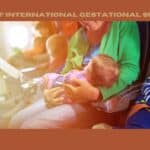1. Surrogate Custody Battle Moves Forward
Melissa Cook, whose story we broke, is moving forward with her custody battle for the triplets she carried as a gestational surrogate for a single man. Melissa’s case brought international attention after the intended father demanded she abort one of the babies because he was worried about the realities of being a single-dad to triplets. The attorneys representing Melissa made their case in federal court this week, as they attempt to establish constitutional rights for surrogate mothers and the children born of these arrangements.
2. ICSI Overuse
Intracytoplasmic Sperm Injection (ICSI) made news this week in a new report that states this technique, originally developed to help infertility in men, is being overused in couples where there is no male infertility problem. “Studies have shown that ICSI results in fewer live births than IVF when used for couples where male infertility is not the problem.” While the report makes no analysis on why this overuse is occurring, I wonder if this is the result of a profit motive.
3. Surrogacy Continues in Thailand
After the awful Baby Gammy story in Thailand, the government rightly cracked down on international surrogacy arrangements. We’ve just learned, however, that out of 50 domestic couples who appealed to the government to use a surrogate mother, eight have been granted permission to move ahead. Another 12 couples will have their cases heard next month. The Committee for Protection of Surrogate Children is the legal body that hears such cases. The best way to protect children is not allow them to be born via surrogacy and stop all surrogacy.
4. Egg Freezing, Race, and Health
I read with interest this opinion piece in the New York Times: “Is Egg Freezing Only for White Women?” I even wrote to the author, to raise my concerns with her. She looked into egg freezing as a family building option after a relationship break-up and as a back-up plan. As a woman of color, she noticed how white all the marketing was around egg freezing. Much to her surprise, when she attended a seminar to learn about the procedure she found herself sitting in a “lily-white” fertility clinic with mostly white attendees. She raises important questions around pregnancy, motherhood, childbearing, and race. Her focus on this article is race, but there are other pressing concerns, namely the health of women of all races. White or non-white, women need to know that egg freezing comes with potential health risks and offers much false hope.
5. She Doesn’t Seem to Know that Sperm Donation Affects Children
A website called SheKnows ran an article by a Lesbian mom who didn’t want to use a sperm bank. She lays out her seven reasons for not wanting to use a sperm bank, which include: it is an expensive process offered by a highly profitable industry, sperm banks can be unsafe and are unethical and “notoriously homophobic and transphobic.” Finally, she realized a friend was perfectly suited for the job and up to the task. Notably, in the list of ways to “add children” to families, she never once thought about how all this might impact the children. Are the kids all right?
This Week in Bioethics Archive
Image by Sònia Pereda via flickr (CC BY-NC-ND 2.0)
Author Profile

- Jennifer Lahl, MA, BSN, RN, is founder and president of The Center for Bioethics and Culture Network. Lahl couples her 25 years of experience as a pediatric critical care nurse, a hospital administrator, and a senior-level nursing manager with a deep passion to speak for those who have no voice. Lahl’s writings have appeared in various publications including Cambridge University Press, the San Francisco Chronicle, the Dallas Morning News, and the American Journal of Bioethics. As a field expert, she is routinely interviewed on radio and television including ABC, CBS, PBS, and NPR. She is also called upon to speak alongside lawmakers and members of the scientific community, even being invited to speak to members of the European Parliament in Brussels to address issues of egg trafficking; she has three times addressed the United Nations during the Commission on the Status of Women on egg and womb trafficking.
Latest entries
 infertilityApril 23, 2024The Rise of International Gestational Surrogacy in the U.S.
infertilityApril 23, 2024The Rise of International Gestational Surrogacy in the U.S. Assisted Reproductive TechnologyApril 16, 2024Founder Jennifer Lahl’s Speech on Surrogacy to the Casablanca Declaration
Assisted Reproductive TechnologyApril 16, 2024Founder Jennifer Lahl’s Speech on Surrogacy to the Casablanca Declaration #BigFertilityFebruary 27, 2024No, Alabama Didn’t Ban IVF
#BigFertilityFebruary 27, 2024No, Alabama Didn’t Ban IVF ArticleSeptember 25, 2023The Little Engine That Could
ArticleSeptember 25, 2023The Little Engine That Could

